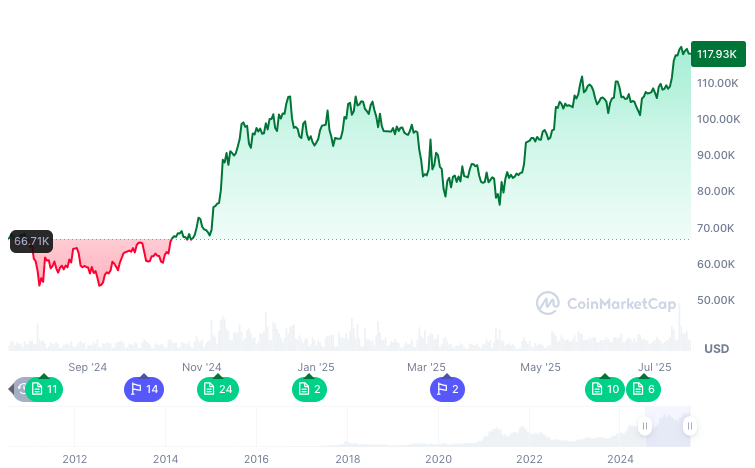It's Giving Subprime Vibes

I'm going to do something different this week and give away the ending and let you decide if you want to stick around: If you're skeptical of Bitcoin, you're likely right. If you're not, you're probably richer than I am from it. That said, the rise of Bitcoin treasury companies, more on them below, is introducing financial products that look like the early stages of the subprime mortgage mess. Different assets, same number go up energy.
Now, let's begin.
I’m a boring retirement investor and that is by design. With 99% of our investments (I’ll talk about that last 1% later), I follow the Boglehead philosophy and stick to broad index funds, mainly VTI (total US market) and VXUS (total global market), with a simple 75/25 split.
This summer, despite the on again off again tariffs and threats to fire the Federal Reserve Chair, markets are chugging along. Economic doctrine tells us that markets are inherently rational but that's clearly not true. Our frequent economic bubbles and subsequent crashes (more on those later too) are a result of irrational human exuberance.
In an effort to not piss off my college econ professor, who subscribes to the newsletter, let me be more precise: markets are rational, but people are dumb as hell, and that functionally creates a distinction without a difference.
A corner of the market that has caught my attention this summer is the price of Bitcoin. I reckon I should disclose here that I own a negligible amount of Bitcoin. I made my initial purchase in 2018 and continue to hold. I'm far from a crypto true believer but degens gonna degen sometimes.
The price of Bitcoin is actually this week’s indicator: 120,000. That’s where Bitcoin landed last week. The rise isn’t tied to a halving, an obvious monetary event, or a geopolitical trigger.

Notably, by most available measures retail interest in Bitcoin is down drastically from previous crypto hype cycles. Normies are not searching for info on or buying Bitcoin in droves. This has been the case since at least November 2022, around the time of Sam Bankman-Fried’s downfall and the collapse of FTX. Nevertheless, since crashing below $17,000 in December 2022, the price has climbed (relatively) steadily to an all time high of $123,091.61 (as of July 19, 2025).
So if retail interest is low, what is driving price action to these all time highs?
There are several factors, among them are ETFs or exchange traded funds. Think of an ETF as a mutual fund that’s designed to be traded. Bitcoin ETFs are issued by traditional financial institutions and allow investors to buy (and trade) Bitcoin, that is “custodied” by a major investment bank. Thanks to the ETFs, Blackrock, creator of the IBIT ETF, now has the second largest Bitcoin holdings on Earth.
Other major financial institutions are following suit issuing ETFs. This means that hedge funds, investment banks, and pension funds are now able to purchase Bitcoin without all the messy cryptography stuff. While there's an interesting and important conversation to be had about whether you think pension funds should be buying among the most volatile assets on Earth, that's not where I want to focus today.
Instead, I want to zero in on the phenomenon of the so-called Bitcoin treasury company. They're the other factor that appears to be driving the Bitcoin price up.
Typically, launched by longtime holders, who got in early and got rich, a Bitcoin treasury is a vehicle designed to issue debt — usually convertible bonds — and then use the proceeds to buy more Bitcoin. If all goes according to plan, the entity pays out dividends to bondholders (retail investors and crypto gamblers alike) and books profit from price appreciation. It’s financial engineering with a heavy dependency on Bitcoin going up and staying up.
Put plainly, in light of slack demand, OG Bitcoin holders are borrowing from dumb money and gamblers (and some true believers) to buy more Bitcoin, creating demand where it's absent, and promising the normies perpetual gains.
These convertible bonds are essentially Bitcoin derivatives. They will be traded with leverage and shorted by hedge funds. There are now more than 200 of these Bitcoin treasury companies. There are people who are absolutely going to make ungodly sums of money on all this.
I will not be one of them.
These financial instruments give me and others hella sub prime mortgage vibes. They're predicated on an ever rising price and things will get very complicated in an extended bear market. Yes, securitizing mortgages from people with zero/awful credit and selling them to investors as “Grade AAA” debt was a license to print money on the way up. But charts can only go up and to the right for so long.
Here's Kevin George in Seeking Alpha making that point
We are now entering the subprime phase, where Bitcoin treasury companies are leveraging their balance sheet to purchase the digital currency in the belief that it can only go higher. That was the prevailing belief on the housing market in 2007.
Everyone born before 1995 knows how that story ended. It is not a question of if the Bitcoin treasury companies come crashing down, but when.
I want to close by talking a bit about the concentration of Bitcoin itself.
Early adopters (and certain libertarians) think of Bitcoin as “Freedom Money.” Whether you believe that's true or not is up to you. But the 20 million Bitcoins currently in circulation are increasingly in the hands of early adopters, Wall Street, and no one else.
Put differently, each time that Bitcoin crashes, as it did in 2022, institutional investors and longtime holders are scooping it up in larger and larger quantities. According to Morningstar, less than 10% of the total Bitcoin supply is held by small investors (people holding less than one Bitcoin). There are many of these small investors but they hold very little Bitcoin. The rest, over 90% of the circulating supply, is held by early adopters, investment banks like the aforementioned Blackrock, and now the Bitcoin treasury companies.
In many ways it was inevitable.
Listen, Bitcoin may go to a million dollars, who knows? But what it is today isn’t what it set out to be. Conceived in the wake of the 2008 financial crisis by a programmer under the pseudonym “Satoshi Nakamoto,” Bitcoin was heralded by its early evangelists as a radical alternative to a corrupt and ossified financial system. Yet today, Bitcoin has become little more than a high-volatility asset, increasingly absorbed into the very financial architecture it once sought to disrupt. It now functions as a speculative playground for institutional capital and a vehicle of wealth consolidation.
It carries with it a concentration of wealth worse than the system it sought to disrupt — one that would make someone in the Royal Court in pre-1789 France blush.
See you next week from the road.